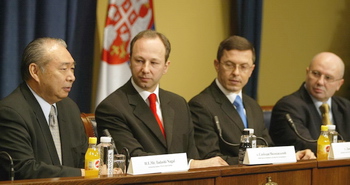- Serbia
Get to know Serbia
- Citizens
Culture and science
Health services
Pension and disability insurance
- Business
Employment
Economy
- Media
- Government
- Contact
Keep in touch
Contact form
Back
Keepin touch
Whether you have a question, comment, suggestion or any problem in the purview of the government, send us your message and we will try to respond as soon as possible. If your problem is not in our purview, we will forward your message to the relevant institution.
Q:
A:
Japanese government gives donation to Serbian agriculture sector
Belgrade,
21 December 2007
Japanese Ambassador to Serbia Tadashi Nagai said today that the Japanese government donated €20 million to the Serbian agriculture sector for the purpose of reviving the production of fertilisers.
Nagai said at a press conference that this donation will help improve the production of crops, which is very important for Serbia since it suffered drought this summer.
He underlined that Japan is helping Serbia long-term disinterestedly because it wants to help our people make a progress and become part of Europe soon, adding that agriculture is the most important sector of the Serbian industry and its future.
State Secretary at the Serbian Ministry of Finance Slobodan Ilic said that the Japanese government is one of the biggest donors to Serbia which has donated a total of €190 million in the past seven years, of which €106 million was intended for humanitarian, development and technical assistance, while the rest was used for repayment of Serbia's debt to Japan.
Ilic also said that Japan's assistance so far has been well balanced and that funds were donated both to Belgrade and other towns in Serbia.
He recalled that the Japanese government has so far allocated €12 million for equipping health centres in Serbia, as well as that it has set aside over €9 million to help renovate the Belgrade public water and sewage company.
Thanks to Japanese donations, 173 young representatives from Serbia came to Japan for professional development, Belgrade got 39 buses, the Belgrade Philharmonic received new instruments and the Drama Faculty got new audio and visual equipment, specified Ilic.
State Secretary of Agriculture, Forestry and Water Management Danilo Golubovic said that Japan’s assistance in agriculture is the most quality way of help because it features the construction of new facilities, new equipment and money.
Golubovic said that any kind of help that stimulates competitiveness of Serbian agriculture is welcome, especially once the Stabilisation and Association Agreement is signed with the EU because Serbia will then embark on the difficult journey of adjusting to the European market.
By reviving the production of fertilisers in Serbia, the price of fertilisers will go down and it will be available to a greater number of entrepreneurs and agricultural producers. This will also affect the increase of competitiveness of products through a reduction in the production investment price, explained Golubovic.
He underlined that Japan is helping Serbia long-term disinterestedly because it wants to help our people make a progress and become part of Europe soon, adding that agriculture is the most important sector of the Serbian industry and its future.
State Secretary at the Serbian Ministry of Finance Slobodan Ilic said that the Japanese government is one of the biggest donors to Serbia which has donated a total of €190 million in the past seven years, of which €106 million was intended for humanitarian, development and technical assistance, while the rest was used for repayment of Serbia's debt to Japan.
Ilic also said that Japan's assistance so far has been well balanced and that funds were donated both to Belgrade and other towns in Serbia.
He recalled that the Japanese government has so far allocated €12 million for equipping health centres in Serbia, as well as that it has set aside over €9 million to help renovate the Belgrade public water and sewage company.
Thanks to Japanese donations, 173 young representatives from Serbia came to Japan for professional development, Belgrade got 39 buses, the Belgrade Philharmonic received new instruments and the Drama Faculty got new audio and visual equipment, specified Ilic.
State Secretary of Agriculture, Forestry and Water Management Danilo Golubovic said that Japan’s assistance in agriculture is the most quality way of help because it features the construction of new facilities, new equipment and money.
Golubovic said that any kind of help that stimulates competitiveness of Serbian agriculture is welcome, especially once the Stabilisation and Association Agreement is signed with the EU because Serbia will then embark on the difficult journey of adjusting to the European market.
By reviving the production of fertilisers in Serbia, the price of fertilisers will go down and it will be available to a greater number of entrepreneurs and agricultural producers. This will also affect the increase of competitiveness of products through a reduction in the production investment price, explained Golubovic.
-
 Belgrade, 22 January 2025
Belgrade, 22 January 2025Egypt one of Serbia’s closest partners on international stage
-
 Belgrade, 9 July 2024
Belgrade, 9 July 2024Support for 104 associations in diaspora that preserve Serbian language, culture
-
 Belgrade, 15 April 2024
Belgrade, 15 April 2024Competition for StarTech grants open until 31 May
-
 Belgrade, 2 October 2023
Belgrade, 2 October 2023Serbia respects Resolution 1244 and will do everything to preserve peace
-
 Belgrade, 13 September 2023
Belgrade, 13 September 2023Day of Serbian Unity to be celebrated outside borders of Serbia, Republika Srpska for the first time
-
 Belgrade, 8 August 2023
Belgrade, 8 August 2023RSD 24.2m in state aid paid out to citizens affected by storm
-
 Belgrade, 17 June 2023
Belgrade, 17 June 2023Belgrade is doing everything to preserve peace in Kosovo and Metohija
-
 Belgrade, 15 June 2023
Belgrade, 15 June 2023Slovenia will continue to support Serbia on its way to EU
-
 Belgrade, 5 May 2023
Belgrade, 5 May 2023Emergency measures, tightening of conditions for possessing weapons
-
 Belgrade, 3 May 2023
Belgrade, 3 May 2023Three days of mourning in Serbia over tragedy at Vladislav Ribnikar primary school

